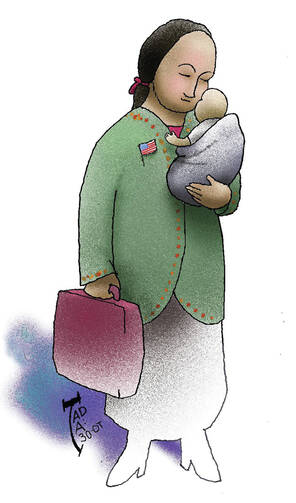God’s Interest
In the covenant code in Exodus, in which Moses reveals God’s prohibitions and commandments to the Israelites, we quickly learn that God is a God who hears the voices of the powerless, who sees the needs of the poor. The terms of the covenant directed the Israelites not to “wrong or oppress a resident alien” or “abuse any widow or orphan.” And “if you take your neighbor’s cloak in pawn, you shall restore it before the sun goes down; for it may be your neighbor’s only clothing to use as cover; in what else shall that person sleep?” God offers the poor divine protection, a protection that is accompanied by promises of judgment on those who exploit the needy. God says, “If you do abuse them, when they cry out to me, I will surely heed their cry,” and “if your neighbor cries out to me, I will listen, for I am compassionate.”
Amy-Jill Levine and Douglas Knight write of God’s care for those in need, saying: “Certainly not all widows were poor, and neither were all foreigners and orphans. But they were the most vulnerable members of the community. Rather than leave their care to the moral compass of those who were better off or to the compassionate individual, the law insists that all members of society bear responsibility for the care of its neediest members” (The Meaning of the Bible).
That we adopt God’s generous care for the neediest among us and not turn away from those most vulnerable is incumbent upon Christians. This concern also requires constant calibration, for individuals and societies have blind spots that block our vision and hide from us the poor among us. These impede our moral vision precisely in those areas where change is needed and affect our ability to see clearly what God has demanded of us.
I passed over just such a command from this section of the covenant code, whose intent is also to guard the poor and weak: “If you lend money to my people, to the poor among you, you shall not deal with them as a creditor; you shall not exact interest from them.” It is not my intention to offer a discourse on what level of interest constitutes usury, whether church teaching regarding usury has changed or whether this teaching applied only to loans among Israelites.
Instead I will simply ask some questions. Does exacting interest from the poor lead to the same sort of moral outrage today that oppressing the orphan and the widow do? What sort of interest do payday loan companies and credit card companies charge? How much debt is required to attend “for profit” colleges or even, it must be said, nonprofit universities, which require massive loans for most students? How well is our financial system giving attention to the poor?
Supporting all of these particular demands of the compassionate God to see and hear the poor among us are two commandments that Judaism taught and Jesus later proclaimed: “You shall love the Lord your God with all your heart, and with all your soul, and with all your mind”; and “You shall love your neighbor as yourself.” The first commandment, known as the Shema (Dt 6:4), asks us to love God foremost; but if the love of God is our foremost guide, we will shape ourselves in the image of the one we love, God, whose commandments allow us to see our neighbor as God sees: as a beloved friend of God. When we see our neighbors as God sees them, we will treat them with the clarity of God’s compassion.
These questions regarding our neighbors go beyond asking what is the letter of the law regarding charging interest, or what is the least I can do for the immigrant who lives among us. But how can I hear what God hears? How can I see my neighbors as God sees them? When we are inspired by the word of God to imitate God’s care for the weak and vulnerable, to hear the cries God hears and to see people as God sees them, then our blindness falls away. We are transformed by God, who desires us to care for all among us who are in need, not just because particular laws govern us but because the love of God and neighbor burns in us.
This article also appeared in print, under the headline “God’s Interest,” in the October 20, 2014, issue.








